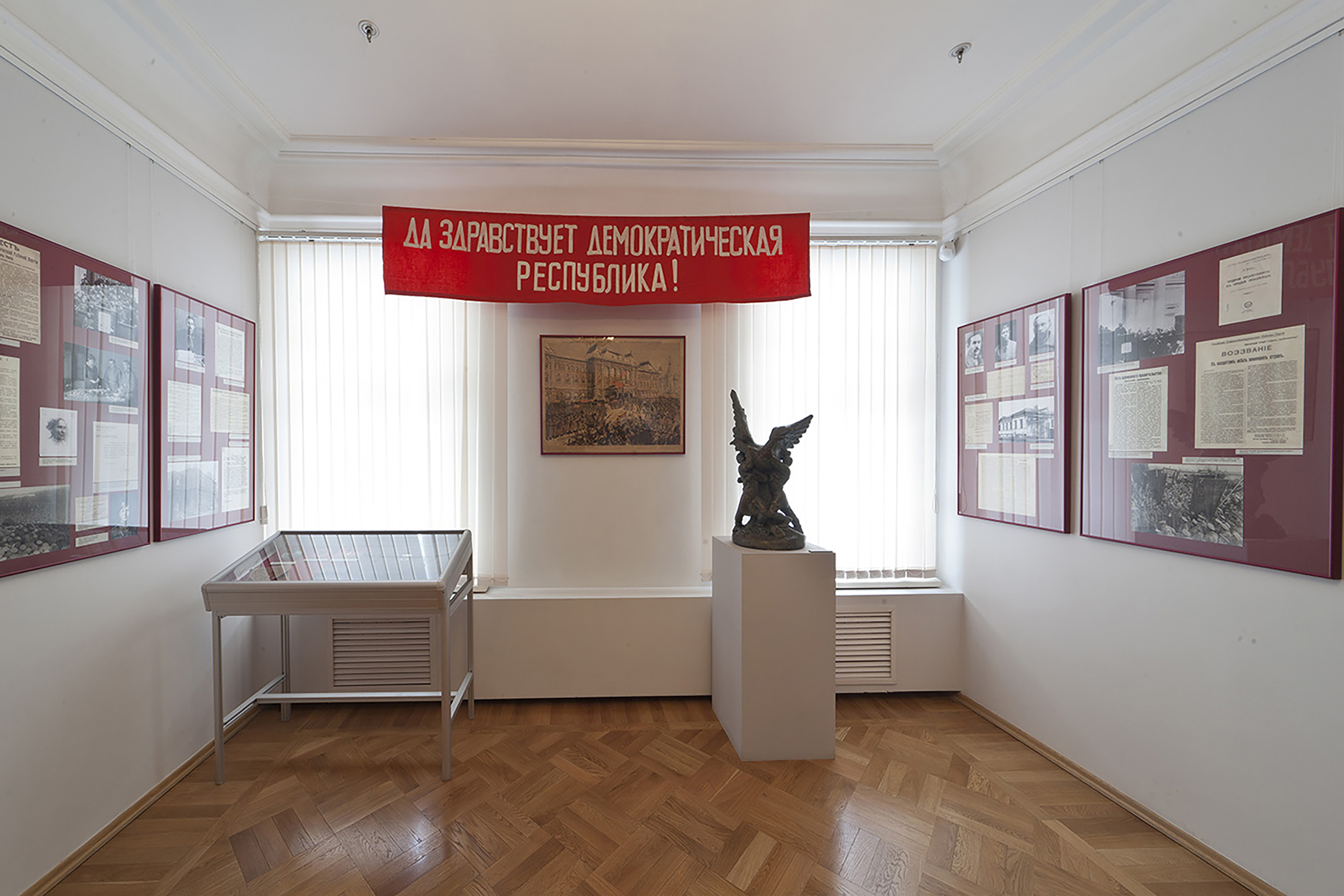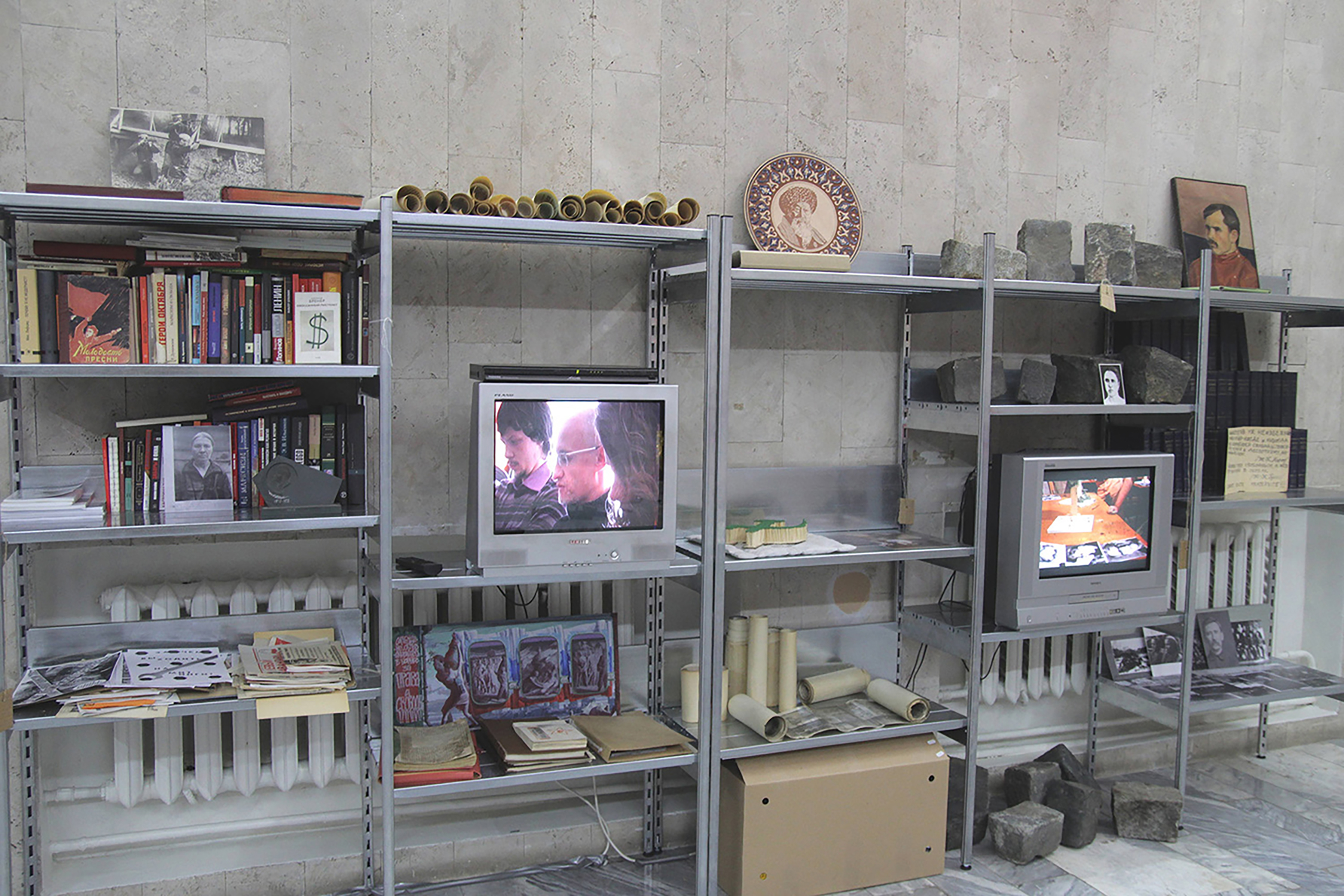The Archive of the Future Museum of History
The concluding exhibition of the Pedagogical Poem project whose participants during the course of ten months investigated the mechanisms of how generally held views about history were generated.

The interdisciplinary project Pedagogical Poem was conceived by Arseniy Zhilyaev and Ilya Budraitskis and organised by the
The exhibition venue was the Presnya Museum, a branch of the State Central Museum of the Contemporary History of Russia which contains material evidence of the three Russian revolutions and one of Europe’s largest dioramas depicting fighting at the barricades in the Moscow Presnya district in 1905.
The preparation of the concluding exhibition of the Pedagogical Poem demonstrates the paradoxical and contradictory function of the historical museum in a contemporary context. The exhibition, originally planned originally planned as an invitation to institutional dialogue within the permanent museum exhibition, was forced to be moved to an autonomous space and took the form of project proposals to update the museum space. These proposals are likely to fail to materialize given the specific nature of today's museums, but they have become a part of the discussion surrounding the contemporary role of museums.
A museum of history is a place that represents memory; it always enters into unique and vitally important relations between the past and the present. On the one hand, the collective experience of previous generations represented in the museum highlights the similarities between then and now and an awareness of history based on the way history develops. On the other hand, this is an institution created by the state with the purpose of pursuing its cultural and educational policy and thus limiting a visitor’s experience. This paradox can either be seen as a distinguishing factor that illustrates our own historical time or, on the contrary, as an aspect of the museum avoiding any immediate relevance.
This is the reason why museums do not always become spaces for open talks; despite the considerable democratization that has taken place in the last century, the level of freedom and requirements of the organizers’ expertise is still highly regulated.
The role of the museums of modern history (former Revolution Museums) in Eastern Europe is even more ambiguous. At the start of the 20th century, they demonstrated to the world an unprecedented example of democratization and innovation. The previous limitations for public access were lifted, workers participated in creating museum exhibitions, private collections opened to the public and, at the same time, a scientific approach to history was introduced. Moreover, museums incorporated statistical data and created thematic installations devoted to the history of the oppressed classes. Unfortunately, during the post-revolutionary period and the years of political stagnation, the museums turned into a dogmatic tool merely expressing the Party’s official ideology. By the end of the 20th century, East European museums not only lacked any innovative methodological groundings for their work but were forced to deny the historical grounding of their own development.

The final exhibition Archive of the Future Museum of History presents several zones that visually reconstruct the atmosphere of an archive. The central space is allocated to the history of the transformation of the Presnya Museum in the course of its entire existence. A model of the unrealized experimental architectural project of the museum can be found adjacent to one illustrating a proposal for updating the exposition formulated by participants of the Pedagogical Poem themselves. The video archive includes documentation of the performance by the Paraphrase theatre, based on the personal stories of contemporary Russian public activists, as well as a documentary film about a guided tour of the Presnya district. A significant component of the exhibition is a public library where everyone can acquaint themselves with the lecture material and the collection of books on the key themes of project. The archival section of the imaginary exhibition incluides a miniature Museum of the Russian Opposition Media of 1991-2012 prepared by the Pedagogical Poem participants in the archives of the Museum of Contemporary History of Russia.
Exhibition makers
Alena Artasheva, Katerina Beloglazova, Gleb Napreenko, Konstantin Novikov, Alexandra Novozhenova, Alexander Povzner, Elizaveta Slavina-Mirskaya, Pavel Bulgakov, Yakov Kirillov, Yegor Koshelev, Valeria Dobrokhotova, Irina Melnikova, Paraphrase Theatre, Katerina Chuchalina, Asya Klescheva, Isabel Makgoeva, Ilya Bezrukov.
Project concept
Arseny Zhilyaev, artist, curator and contemporary art theorist. He was educated at the Institute of Contemporary Art in Moscow (2006–2007) and Valand School of Fine Arts in Gothenburg (2008–2010). He has been on the editorial board of the Moscow Art Magazine since 2010. Winner of the Innovation (2010) and Soratnik Contemporary Art (2010, 2012) prizes. Selected group shows include: The Way of the Enthusiasts, (Casa dei Tre Oci, Venice, 2012); Practice for Everyday Life (Calvert 22, London, 2011); Modernikon (Fondazione Sandretto Re Rebaudengo, Turin, 2010); History Lesson (Palais de Tokyo, Paris, 2010); Russian Utopias (Garage Centre for Contemporary Art, Moscow, 2010); Open House Day (Moscow Museum of Modern Art, 2010). Selected solo shows include The Museum of Proletarian Culture. Bohemian Industrialization (State Tretyakov Gallery, Moscow, 2012); Radio October (Fabrika, Moscow, 2011); Rational Egoism (Regina Gallery, Moscow/London, 2010); The New Museum of the Revolution (H.L.A.M. Gallery, Voronezh, 2009).
lya Budraitskis, artist, theorist and historian. Born in Moscow in 1981, he was educated in the history department of the Russian Academy of Education (2003–2008), and since 2009 has been a graduate student at the Institute of General History of the Russian Academy of Sciences. Since 2010 he has been on the editorial board of the Moscow Art Magazine. As a curator and/or artist, he has taken part in the following exhibitions: Petroliana (Moscow Museum of Modern Art, 2007); Progressive Nostalgia (Prato, Italy, 2007); Battle for the Flag (The New Manege, Moscow, 2008); European Studios (Central House of Artists, Moscow, 2009); Conquered City (Regina Gallery, Moscow, 2009); 40 Lives of One Space (Red October, 2009); Impossible Communities (Moscow Museum of Modern Art, 2011); Main Project of the 4th Moscow Biennale of Contemporary Art (TSUM, Moscow, 2011).